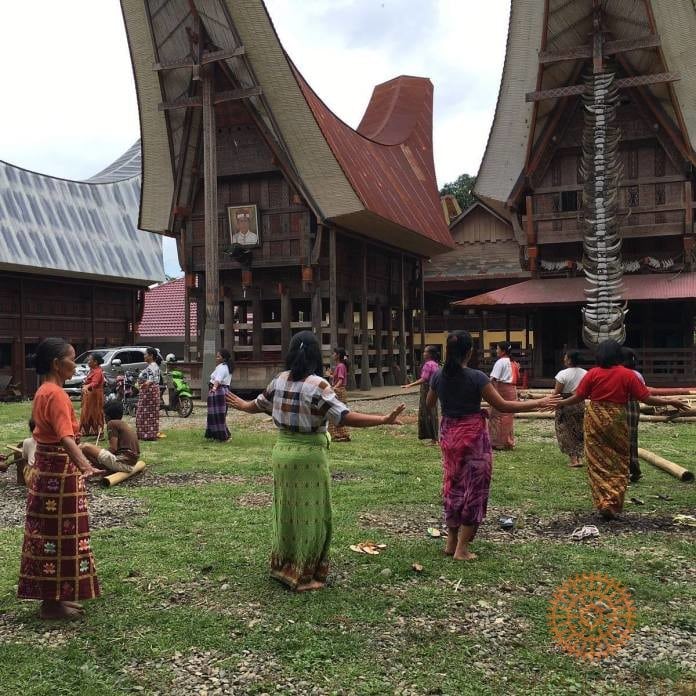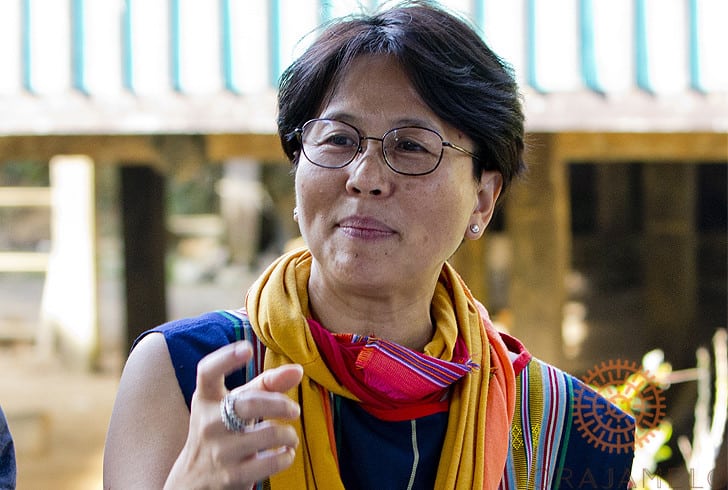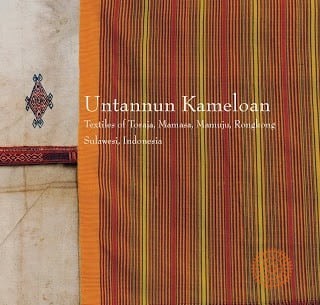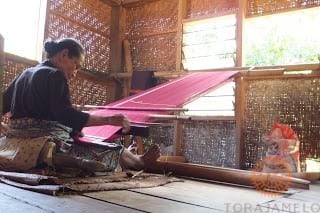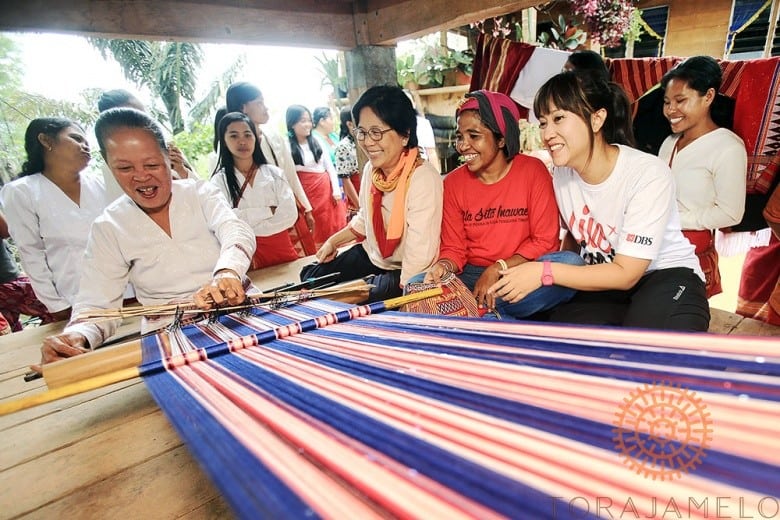
Catalyst For Change
By : admin | July 3, 2018“Don’t ever give up your dream for anything or for anybody, no matter what.”
— DINNY JUSUF

Dinny Jusuf
BY JESSICA SMULDERS COHEN
When I first met Dinny in my parents’ living room in Jakarta, just around the corner from TORAJAMELO’s shop in Kemang, her open face and smiling eyes were instantly likable. She introduced herself according to her business card: mother, wife, and dreamer. Her two adult children (one a wise man, the other a wild spirit, according to her) and her Torajanese husband are the pillars of her existence. As for dreamer, she admits that people often think she is crazy, because she always does what she feels like and believes in. Once I was back in wintery London, I very much enjoyed following up on those early conversations via Skype calls to Toraja a couple of months later.
TORAJAMELO (beautiful Toraja) was created in response to a cause, rather than as a planned social enterprise, Dinny says. “We didn’t even know what a social enterprise was, and suddenly we were being branded as one.”
She sees the endeavor as simply giving women back their rights — the right to be at home with their children; the right to earn a living to support their family, free from abuse; the right to creativity. The chosen tool for this in Toraja — especially as the lower castes of women in her husband’s village are weavers — is weaving. Dinny also admits she has a soft spot for the craft, and feels it needs more publicity and recognition compared to the already famous Indonesian batik.
Such a philanthropic but pragmatic enterprise did not materialize out of thin air. Dinny brings with her an impressive professional track record: first as a successful banker, then as the mother of two, then as Secretary General of the Indonesian National Commission on Anti-Violence Against Women, when she also cofounded Suara Ibu Peduli (The Voice of Concerned Mothers). In fact, she says she settled in Toraja to finally take a break. Despite that desire for a rest, however, it was not long after she met the local weavers — in 2008 while her husband was building them a house — that TORAJAMELO was born.
The Torajanese villagers are predominantly poor farmers, and even though they once had a strong weaving tradition, they no longer had much of a market for it. The number of overseas tourists who visit for the local culture (including textiles, ceremonies, and nature, especially hiking) dropped precipitously after the terrorist attacks in Bali. So Dinny decided to buy up all the cloth they were making and sell it in Jakarta. A couple of years later she appointed her sister Nina (who is also a women’s rights activist but has a training in fashion) as the head designer, and went on to design the garments we see today.
It was this sister dream team who went on to change the lives of not only Torajanese weavers, but countless other women across the archipelago. Dinny has a deep-seated love of Indonesia, Indonesian culture, and especially Indonesia’s traditionally woven cloth. She feels this comes from her mother, who — while pregnant with her, and despite being ethnically Chinese — was completely in love with both Dinny’s Javanese father and the land from whence he came. Notwithstanding this love, her mother eventually immigrated to the United States when the discrimination against her and her children’s ethnicity became too much, bringing five of her six children one by one to join her. Dinny was the only one who decided to remain behind, despite also facing the same prejudices as a Chinese-looking woman in Indonesia that her mother had wanted to escape. She eventually coaxed Nina back for six months a year to help with the operation of TORAJAMELO, which is run from their clothing enterprise in Bandung.
Despite this support from her sister, as well as that of her other siblings and her own family, things have been far from easy. The first battle in Toraja was overcoming the resistance she faced from her husband’s family, and even her husband himself. Being of a higher caste, they were not supportive of her work with the lowly weavers. Finally, the wary prediction of a local wise man also came true: Dinny was deceived by a local weaver who tried to steal her business by faking TORAJAMELO weaver signatures to sell her own proposal for government funding. In this case she was surprised that it was her husband and his family came to her aid, supporting her efforts to resolve the issue. Her latest challenge came when funding was dropped mere weeks from the opening of a momentous exhibition at the textile museum of Jakarta. That time it was her ex-colleagues from Citibank who came to her rescue (personally, not on behalf of the bank). The weavers themselves also pitched in, insisting that a group big enough to do a ceremonial dance had to travel to Jakarta all the way from East Flores to participate, instead of the four representatives that TORAJAMELO could fund. In both cases she found solace in family and friends, and was deeply moved by the purely emotional response to difficulty.

As with the current trend in social entrepreneurship, Dinny has a hard time responding to ideas of modern feminism and global sustainability. She simply does what she feels and knows is right for the weavers and their traditions, instead of looking to name or brand it. For her the greatest impact is seeing Torajanese women return to weave and be with their families. The sustainability aspect comes from women supporting women across generations, and the preservation of cultural identity. When the women are overseas they do not weave — it belongs to the context of their Torajanese house and village, with the support of family and community. “They become whole again,” when they return, explains Dinny. “TORAJAMELO acts as a catalyst for returning their dignity.”
This is both her biggest challenge and most satisfying reward. It was not easy convincing the weavers that they could make better lives for themselves. In many ways they were content to accept their fate. However, now that they see the results of Dinny’s efforts, they are extremely pleased with the improvement.
One of the women who has inspired Dinny the most, a woman she looks up to as a mentor and friend, is a socialist who spent time in jail for her efforts. When Dinny visited her and talked of the strife she faced, her friend would always say, “You may rest, but you cannot ever give up.” This is evident in her work: She has helped more than 48,000 market women set up cooperatives, which are still going strong despite economic difficulties. She lives by the motto that everybody can give a helping hand. “You don’t have to be rich to help others,” she says. “If you have a roof over your head, clothes on your back, and eat three meals a day, you are ready.”
Another favorite piece of advice came from the aforementioned Torajanese wise man: “Dinny, just do it — I give you my blessing. You will be betrayed by your own kind, but don’t give up. I will pray for you. Just keep going.” She laughed at first when he said this, but when his prophecy came true she was shocked at his accuracy!

Young Weavers
Dinny continues to endeavor to keep doing what she believes in, no matter who laughs at her — as her friends often do. Given that people around her, even those in high places, have expressed their envy of her freedom, she has made her own mantra: “Don’t ever give up your dream for anything or for anybody, no matter what.”
“What will you do next?” I ask her. Now that she has reached the 10-year milestone with TORAJAMELO, Dinny has started thinking, especially now that Nina has to spend more time in the United States to do her work. She says she wants to mentor young professional women, whom she believes she can help and inspire, given her breadth of experience as a banker, activist, and women’s rights advocate. She is therefore planning to take TORAJAMELO in the direction of “Thought Leadership”, with the aim of using the original vision to lift marginalized women out of poverty by sharing, inspiring and replicating the work Dinny has done with the weavers. It’s time to pass on the baton. And maybe, finally, get the rest she most certainly deserves.
Dinny Jusuf is the mother-wife-dreamer founder and CEO of TORAJAMELO, and is in charge of Public Relations, Finance and Marketing. Formally established in 2010, TORAJAMELO means “beautiful Toraja”, and is an endeavour to rejuvenate the traditional back-strap loom weaving traditions of Toraja, Sulawesi, Indonesia. Dinny previously worked with Citibank, where she turned around The Training Division from a cost center to a profit making one. Dinny is a women’s activist and was The Secretary General of the Indonesian National Commission on Anti Violence Against Women, and co-founder of women organizations such as Suara Ibu Peduli (The Voice of Concerned Mothers). Follow Instagram @torajamelo and Facebook @torajamelo.
